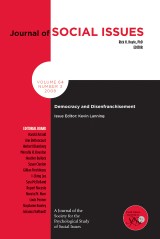Details

Democracy and Disenfranchisement
Journal of Social Issues, Band 2 1. Aufl.
|
49,99 € |
|
| Verlag: | Wiley-Blackwell |
| Format: | |
| Veröffentl.: | 22.04.2009 |
| ISBN/EAN: | 9781444307344 |
| Sprache: | englisch |
| Anzahl Seiten: | 300 |
DRM-geschütztes eBook, Sie benötigen z.B. Adobe Digital Editions und eine Adobe ID zum Lesen.
Beschreibungen
Psychologists, political scientists, and experts in election law present a multidisciplinary perspective on voting. <ul> <li>Personality characteristics such as motivation, values, and efficacy are considered, as are demographic variables such as education, age, and social class</li> <li> <div>Examines the reciprocal relationship that exists in the functions of voting for individual and society: the interplay between persons and institutions gives rise to the perception that a government is or is not legitimate, and to the sense that an individual does, or does not, belong</div> </li> </ul>
<p><b>INTRODUCTION</b></p> <p>Democracy, Voting, and Disenfranchisement in the United States: A Social Psychological Perspective 431<br /><i>Kevin Lanning</i></p> <p><b>NORMATIVE PERSPECTIVES: THE FUNCTIONS OF POLITICAL PARTICIPATION</b></p> <p>The Psychology of Enfranchisement: Engaging and Fostering Inclusion of Members through Voting and Decision-Making Procedures 447<br /><i>Celia M. Gonzalez and Tom R. Tyler</i></p> <p>A Game-Theoretic View of Voting 467<br /><i>Joachim I. Brueger and Melissa Acevedo</i></p> <p>Electoral Simultaneity: Expressing Equal Respect 487<br /><i>Dennis F. Thompson</i></p> <p><b>DIFFERENTIAL PERSPECTIVES: CHARACTERISTICS OF THE VOTER</b></p> <p>The Psychological and Institutional Determinants of Early Voting 503<br /><i>Paul Gronke and Daniel Krantz Toffey</i></p> <p>Why Do People Vote? A Psychological Analysis of the Causes of Voter Turnout 525<br /><i>Joshua Harder and Jon A. Krosnick</i></p> <p>Beliefs about Deliberation: Personal and Normative Dimensions 551<br /><i>Eugene Borgida, Keilah A. Worth, Brad Lippmann, Damla Ergun, and James Farr</i></p> <p><b>DYNAMIC PERSPECTIVES: THE ROOTS OF POLITICAL PARTICIPATION</b></p> <p>Political Participation and Cumulative Disadvantage: The Impact of Economic and Social Hardship on Young Citizens 571<br /><i>Julianna Sandell Pacheco and Eric Pultzer</i></p> <p>The "Antidemocratic Personality" Revisited: A Cross-NationalInvestigation of Working-Class Authoritarianism 595<br /><i>Jaime L. Napier and John T. Jost</i></p> <p>Race and Redistricting: What the Print Media Conveys to the Public about the Role of Race 619<br /><i>Damla Ergun, Grace Deason, Eugene Borgida, and Guy-Uriel Charles</i></p> <p><b>COMMENTARY</b></p> <p>Will Democracy Win? 639<br /><i>Gina V. Caprara</i></p> <p><b>2007 SPSSI PRESIDENTIAL ADDRESS</b></p> <p>Introduction to Irene Hanson Frieze's SPSSI Presidential Address 661<br /><i>Marybeth Shinn</i></p> <p>Social Policy, Feminism, and Research on Violence in Close Relationships 665<br /><i>Irene H. Frieze</i></p>
<b>Kevin Lanning</b> received his PhD from UC Berkeley and is an Associate Professor of Psychology at the Wilkes Honors College of Florida Atlantic University. His research examines personality measurement, personality development and the structure of sociopolitical attitudes. A resident of Palm Beach County, Florida, he is a voting rights activist and the author of a number of editorial pieces on election reform. Lanning recently edited a special issue of the SPSSI electronic journal ASAP on the Social Psychology of the 2004 US Presidential Election.
American democracy depends upon voting, yet for the individual, the benefits of voting appear largely intangible. In the present collection, psychologists, political scientists, and experts in election law present a multidisciplinary perspective on voting. Personality characteristics such as motivation, values, and efficacy are considered, as are demographic variables such as education, age, and social class. Voting is shaped, too, by institutions including schools and the media, and, evidently, by the laws and practices of government. A reciprocal relationship exists in the functions of voting for individual and society: The interplay between persons and institutions gives rise to the perception that a government is or is not legitimate, and to the sense that an individual does, or does not, belong.

















